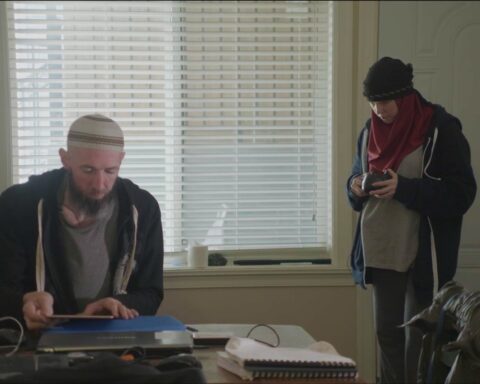Collective
(Romania/Luxemburg, 109 min.)
Dir. Alexander Nanau
Programme: TIFF Docs (North American Premiere)
Anyone who wants to understand the line between journalism and documentary filmmaking needs to see Alexander Nanau’s Collective. This riveting newsroom doc offers a fly-on-the-wall portrait of journalists at Romania’s Sports Gazette newspaper. It’s as informative as a long read in the Saturday paper and as wildly engaging as a political thriller. Nanau is there every step of the way with the Sports Gazette team of Cătălin Tolontan, the publication’s editor-in-chief, and investigative journalists Mirela Neag and Razvan Lutac as they find an explosive story in the aftermath of tragedy.
Their lead begins with a 2015 disaster in which a fire broke out at Bucharest’s Colectiv nightclub and killed 27 people while leaving over 100 others with severe burns and injuries. The victims, nearly all of which are young people, are collateral damage for a negligent system and government corruption. Looking deeper into the causes of the deaths that continue as survivors perish in hospital, the team uncovers a political scandal that awakens the nation and brings down a government. If the story is an extraordinary feat of journalism, the film is equally commendable for its engaging and urgent glimpse into the action of the newsroom.
Nanau rejects interviews and talking heads in favour of straight cinema verité. The film doesn’t miss a beat in conveying the facts and laying out the players as the journalists speak with survivors, family members, medical staff, and politicians to understand the mind-boggling mess of Romania’s health care system. With that being said, the sheer volume of information presented is overwhelming and disorientating, so, like a seasoned journalist, one better come to Collective ready to take notes.
The investigation into the fire explores why so many survivors ended up dying once they were taken to Bucharest’s Burn Hospital. Camelia Roiu, a fearless doctor and whistleblower from the hospital, approaches the Sports Gazette team with devastating news and revolting video evidence that reveals a broken system. The reporters learn that the hospital uses diluted disinfectants, thus “sterilizing” tools used to cure for patients with products that are too weak to be of any use, while the company providing the faulty product reaps huge benefits. This negligence leaves the burn victims exposed to aggressive bacteria when any patient in a burn unit needs to be housed in a sterile environment to reduce the risk of infection that can happen so precariously. Roiu offers video footage of patients lying in their beds as worms ravage their flesh, and they die because their health care providers cannot provide care with the tools they are given.
One twist reveals another as the Sports Gazette team follows each lead. Each breaking headline adds to a cultural awakening as Romanians hold the government accountable for its complacency and corruption. When the scandal forces the health minister to (rightly) resign, Tolontan and his team find themselves in constant conversation with the young new replacement, Vlad Voiculescu, who approaches the controversy from his background as an activist who smuggled drugs into the country to care for cancer patients. Voiculescu brings a sense of change to the film as his office affords the Sports Gazette and Nanau’s crew a greater level of transparency than his predecessor gave them. He listens, he asks questions, and he makes unpopular decisions if it means preventing another needless death.
However, the film also captures the inevitable politicization of the scandal. An upcoming election looms throughout the film as Voiculescu grasps that any failure to act rightly in the eyes of the public could mean the end of his political career and those of his peers. At the same time, Nanau’s all-encompassing portrait of the scandal shows how any solution to such widespread corruption is beyond the reach of any one optimistic politician. Like the survivors treated with faulty disinfectant, he doesn’t have a chance against a rigged system.
Nanau’s clear point of view makes for a compelling and involving film experience while harnessing the objective reportage of his subjects. There are stakeouts and clandestine shoots that one could not include as easily, or as thrillingly, in a straightforward news piece. Like this year’s equally incendiary journalism doc This Is Not a Movie about Robert Fisk, Collective is unabashedly “neutral and unbiased on the side of those who suffer,” as Fisk says. Nanau brings the voices and experiences of survivors into the fold to include the human faces for which the consequences of political corruption impacts their daily lives. At the heart of the film are the experiences of survivors and the families of those who perished. This is their story—human drama with all the facts.












